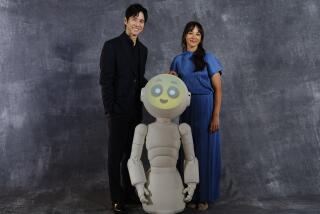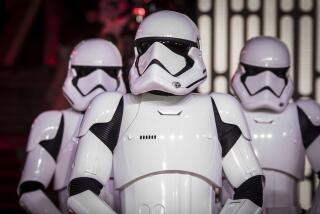Cutting Edge: ‘Star Wars’ and its homely droid BB-8 put the spotlight on robotics
SAN DIEGO — Slow your roll, BB-8. It’s time for your close-up.
Consumers are in full swoon over the roly-poly sort of homely little droid featured in the new “Star Wars: The Force Awakens.”
Walt Disney Studios included a glimpse of BB-8 in a movie trailer that first aired in November 2014. People lit up social media with interest, basically asking, “Is this the droid we’re looking for?”
The question was partly answered this fall when Sphero introduced a toy version of BB-8, a ball-shaped droid that has a highly expressive dome head and a vocabulary made up of cute beeps, whirs and whistles. Many retailers were soon overwhelmed with orders, even though the toy sells for $149.
Now comes the verdict from moviegoers.
“I’d say that R2-D2 should be scared that he’ll be supplanted as the world’s favorite droid,” said Steve Snyder, executive director of the Reuben H. Fleet Science Center in San Diego’s Balboa Park.
The science center recently held a sold-out screening of “The Force Awakens,” preceded by a party where scientists talked about the technological advances that would have be made to build real droids, and for humans to more broadly explore space.
It’s a fitting topic in San Diego, where the RoboUniverse conference and expo was held last week.
Long before “Stars Wars” director J.J. Abrams came up with the idea for BB-8, scientists and engineers at UC San Diego were working on robotic technology, including systems used in toys.
Tom Bewley, one of the school’s mechanical engineering professors, helped to develop MiP, a self-balancing robotic toy that hit the market last year. MiP can be controlled by hand gestures, a rapidly growing area of robotics.
Bewley also developed IceCube, a small, self-propelled spherical robot — or ‘spherebot’ — that is meant to aid first responders and the military.
IceCube isn’t cute. But like BB-8, it can roll in any direction.
“It’s a good technology,” Bewley said. “The sphere is the most 3-D shape in nature. It’s a very pure form of something that can move, and it is maneuverable.”
Bewley’s work is part of a much larger effort by UC San Diego to develop machines that use such things as powerful sensors and artificial intelligence to size up people’s thoughts, movements and feelings.
Like the droids in “Star Wars,” such machines are meant to anticipate and fulfill people’s needs. BB-8 also can sense where it’s at and how things around it are changing.
It’s called contextual awareness, and it’s another hot area of robotics. UC San Diego recently founded an institute that is entirely devoted to the topic.
Robotics is a tough field but one filled with optimists, including Nate Delson, a mechanical engineering professor at UC San Diego who recently helped organize a “Stars Wars”-themed student robotics contest.
“Making a controllable ball is pretty cool,” Delson said. “Already we see toys like the Sphero that can roll on command on flat surfaces.
“The question remains whether one could create a device that could traverse a wide range of surfaces, including hills and rolling over obstacles. I believe it would be possible if enough engineering effort is put into it. Considering that the large majority of land is not paved and there are many places where wheeled vehicles cannot go, this may be worth doing.”
Consumer demand will dictate what happens, said Marius Buibas, co-founder of Accel Robotics, a San Diego start-up that’s developing a robot photographer.
“A tremendous amount of progress has been made in technology. Just look at your cellphone,” Buibas said. “It fills things in when you’re doing a Google search. Siri wakes me up when I want. It can recommend a good restaurant.
“The fact that all of this isn’t embodied in a robot doesn’t matter. If there is a need for something like a droid, someone will pull it all together.”
Whether there’s a need or not, Snyder said there’s no denying the fundamental appeal of BB-8.
“The bottom line is that it’s cute,” Snyder said. “There are many aspects of it that are reminiscent of a small child. It doesn’t speak words, but you know what it means. It’s innocent and seems non-threatening. These are the sort of things that make us think fondly of toddlers.”
Moviegoers also love the role droids play, said Francis French, education director at the San Diego Air & Space Museum.
“R2-D2 and BB-8 resonate with audiences because they sort of tag along in the movies and watch humans do crazy things,” French said. “They’re like bystanders who have the viewpoint of the audience, and who often have a slightly bigger view of what’s going on. It really helps put the viewer in the story. The fact that they don’t say much allows us to imagine their thoughts are the same as ours.”
Robbins covers technology for the San Diego Union-Tribune






